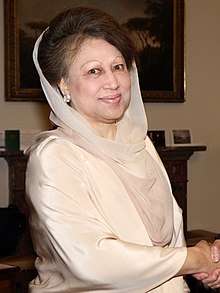Khaleda Zia
| Khaleda Zia | |
|---|---|
| খালেদা জিয়া | |
 |
|
| Leader of the Bangladesh Nationalist Party | |
|
Assumed office 30 May 1984 |
|
| Preceded by | Abdus Sattar |
| 9th Prime Minister of Bangladesh | |
|
In office 10 October 2001 – 29 October 2006 |
|
| President |
Shahabuddin Ahmed Badruddoza Chowdhury Iajuddin Ahmed |
| Preceded by | Latifur Rahman (Acting) |
| Succeeded by | Iajuddin Ahmed (Acting) |
|
In office 20 March 1991 – 30 March 1996 |
|
| President | Shahabuddin Ahmed (Acting) |
| Preceded by | Kazi Zafar Ahmed |
| Succeeded by | Muhammad Habibur Rahman (Acting) |
| Leader of the Opposition | |
|
In office 29 December 2008 – 9 January 2014 |
|
| Preceded by | Sheikh Hasina |
| Succeeded by | Rowshan Ershad |
|
In office 23 June 1996 – 15 July 2001 |
|
| Preceded by | Sheikh Hasina |
| Succeeded by | Sheikh Hasina |
| Personal details | |
| Born |
Khaleda Majumder 15 August 1945 Dinajpur, British Raj (now Bangladesh) |
| Political party | Bangladesh Nationalist Party (1979–present) |
| Other political affiliations |
Four Party Alliance (2001–2011) 18 Party Alliance (2011–present) |
| Spouse(s) | Ziaur Rahman (1960–1981) |
| Children |
Tarique Rahman Arafat Rahman |
| Mother | Taiyyaba Majumder |
| Father | Iskandar Majumder |
| Relatives |
Sayeed Iskander (brother) Shamim Iskander (brother) Khurshid Jahan (sister) Shahrin Islam Tuhin (nephew) Saiful Islam Duke (nephew) Zaima Rahman (granddaughter) Zahia Rahman (granddaughter) Zafirah Rahman (granddaughter) |
Begum Khaleda Zia (IPA: kʰaled̪a dʒia; née Majumder, born 15 August 1945) is a Bangladeshi politician who was the Prime Minister of Bangladesh from 1991 to 1996 and again from 2001 to 2006. When she took office in 1991, she was the first woman in the country's history and second in the Muslim world (after Benazir Bhutto of Pakistan in 1988–1990) to head a democratic government as prime minister. Zia was the First Lady of Bangladesh during the presidency of her husband Ziaur Rahman. She is the chairperson and leader of the Bangladesh Nationalist Party (BNP) which was founded by Rahman in the late 1970s.
After a military coup in 1982, led by Army Chief General H M Ershad, Zia helped lead the continuing movement for democracy until the fall of military dictator Ershad in 1990. Khaleda became prime minister following the victory of the BNP in the 1991 general election. She also served briefly in the short-lived government in 1996, when other parties had boycotted the first election. In the next round of general elections of 1996, the Awami League came to power. Her party came to power again in 2001. She has been elected to five separate parliamentary constituencies in the general elections of 1991, 1996 and 2001.
In its list of the 100 Most Powerful Women in the World, Forbes magazine ranked Zia at number 14 in 2004, number 29 in 2005, and number 33 in 2006.
...
Wikipedia
